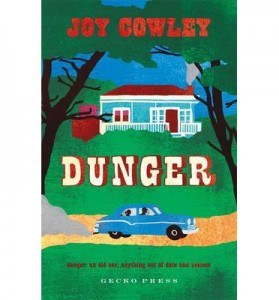lip lit: dunger

I recently spent five nights in what felt like the middle of nowhere, with no phone reception and no internet. Okay, so phone reception was just a ten minute drive up a hill if I needed it, but I found I didn’t, unlike some of the other adults I was staying with. Usually, teenagers are prime targets as people who wouldn’t survive without a phone and internet, but let’s face it, teenagers aren’t the only culprits any more.
For siblings William and Melissa, who share the narration in Joy Cowley’s Dunger, the experience is intensified by the fact they must spend ten days not only with no contact with the rest of the world, but alone with their aging grandparents, instead of spending their time holidaying in Queenstown as their parents promised. Eleven-year-old William and fourteen-year-old Melissa are essentially bribed into agreeing to the holiday, where they are enlisted to help their grandparents clean out and tidy up their holiday shack. Keeping the reward they’ve been promised at the end of it all firmly in sight as motivation, they endure their grandparents’ petty arguments and archaic ways of living, with no one to vent to at the end of the day but each other.
While Cowley takes the clichéd themes of navigating the generation gap and of young people not appreciating their grandparents and learning from them while they still have the chance, she populates her novel with strong characters which bring these ideas to life in a fresh way. William and Melissa alternate narrating chapter by chapter, which is off-putting at first, but then seamlessly melds together and adds to the narrative rather than detracting from it.
The novel moves slowly, yet perhaps this is a deliberate choice in an ode to older times, when the pressure to have everything now didn’t exist and Google wasn’t only a click away. Or perhaps this is so younger readers feel the pain the protagonists endure at their supposed holiday, cut off from civilisation. Whether it was intentional or not, it became frustrating for me as a reader, because I didn’t feel any urgency to keep turning the pages to find out what would happen next and it was an effort to get to the end of the book.
What really makes this novel is Cowley’s wonderful characterisation, particularly in the grandfather and Melissa. Both of these characters could have easily become stereotypes of their respective generations. In the very first chapter, for example, we learn that Melissa walked onto a bouncy castle in her stilettos and pierced a hole in the rubber, causing the bouncy castle to deflate. Our first introduction to the grandfather is of his poor parking skills and strong bickering skills. But it soon becomes apparent that these two characters both have more to offer than meets the eye. William and the grandmother are strong characters too, however neither of them are clichéd to begin with and therefore their unique characteristics are revealed immediately, instead of slowly being uncovered as with Melissa and the grandfather.
Dunger is an enjoyable read, and a subtle reminder to take pleasure in the small things: the company of loved ones, the environment and the home. Cowley’s novel also reassures that disconnecting from technology for a few days is not the end of the world, and that you might even learn something that Google can’t teach you, a lesson not only for young’uns, but one that a few of the older generations would do well to remember too.

